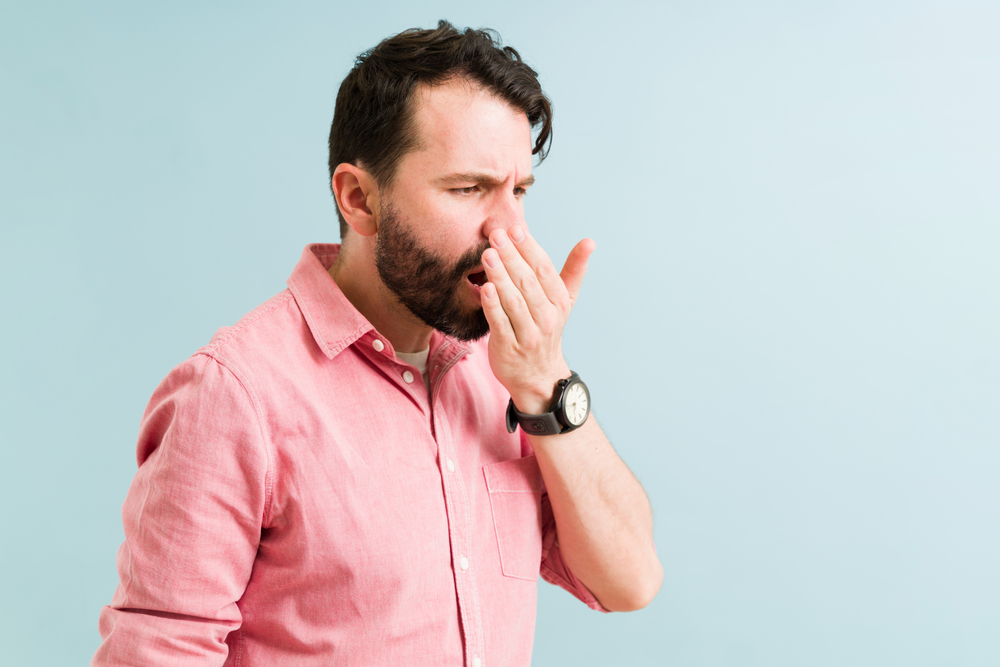Not surprisingly, store shelves are filled with products designed to prevent bad breath, including mints, mouthwash, and other products. Many of these products are short-term solutions. The worst breath starts in your mouth and is caused by the following:
- Certain foods
- Tobacco products
- Poor dental hygiene
- Dry mouth
- health conditions
Bad breath is treatable with regular, professional dental hygiene. If simple self-care methods aren’t effective at addressing the issue, Medical Arts Dentistry can schedule a checkup to determine if a more severe condition is the cause of your bad breath.
Infections In Your Mouth
Unpleasant breath can be associated with surgical incisions following oral surgery, such as tooth removal, tooth decay, gum disease, or mouth sores. Gum disease is caused by tartar accumulation on the teeth. When you fail to floss or brush properly, bacteria in your mouth produce toxins that cause harm. This can cause gum irritation which causes pockets to form between your teeth and gums that contain food, and cause bad breath.
Poor Dental Hygiene
If you don’t floss or brush your teeth regularly, food particles will remain in your mouth, which will cause bad breath. A thin, colorless coating of bacteria (plaque) is deposited on your teeth. If plaque is not eliminated, it can irritate your gums, which in the long term can lead to pockets between your teeth and gum that are filled with plaque (periodontitis). Your tongue can also harbor bacteria that produce smells. Dentures that are not maintained properly or regularly or have improper fits, can harbor bacteria that produce odor.
Dental Work
When a cavity or decayed tooth occurs, plaque (food particles and bacteria) is deposited in the cavity, causing bad breath. Bleeding or dry socket after dental procedures ( the removal of wisdom teeth) can lead to bad breath until the wound heals.
Tobacco Products
Smoking results in an unpleasant odor in the mouth. Those who smoke or take oral tobacco are also more susceptible to gum disease. Smoking can lead to your mouth drying, which causes the odor of an ashtray to emanate from your mouth.
Dry Mouth.
Saliva serves to eliminate bacteria that cause unpleasant smells. A condition called dry mouth or xerostomia (zeer-o-STOE-me-uh) can lead to bad breath because the production of saliva is decreased. A dry mouth is a natural occurrence during sleep, which causes the term “morning breath”, this is exacerbated if you sleep with your mouth open. Chronic dry mouth is typically caused by a lack of saliva in your salivary glands, as well as diseases like diabetes.
Food.
The dissolution of food particles near your teeth facilitates the growth of bacteria and results in a foul scent. Other food items, such as onions, garlic, and spices, can also lead to bad breath. Additionally, alcoholic and caffeinated beverages like coffee can lead to your mouth becoming dry. After these foods are metabolized, they enter your circulatory system, traveled to your lungs, and have an effect on your breath.
Other Mouth, Nose, and Throat Conditions.
Occasional bad breath is caused by small stones that accumulate in the tonsils, these stones are covered by bacteria that produce odor. Infections or chronic inflammation in the nose, sinuses, or throat that causes postnasal drip can also lead to bad breath.
Other Causes
Diseases and conditions that release chemicals have a distinct smell in the air because of the chemicals they release. The reflux of stomach acids for a long period of time (GERD) can cause bad breath. Children that have bad breath are often the result of a foreign object, such as a piece of food, that is stuck in their nostrils.
Bad breath is typically caused by the mouth and is caused by a variety of different causes, including your diet, lifestyle, and medical conditions. Alter your lifestyle habits, such as flossing your teeth and tongue after eating, using dental floss, and drinking more water. If home care isn’t effective, contact Medical Arts Dentistry at (912) 355-0605 for our Savannah location and (912) 921-0401 for our Georgetown location to schedule an appointment with us to have a professional assessment.

